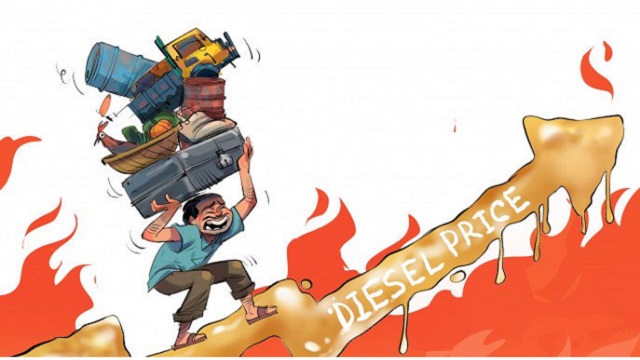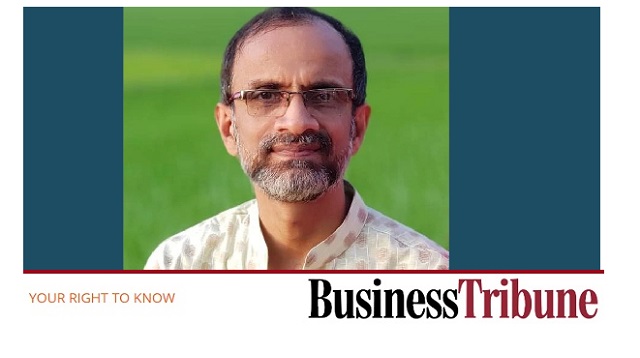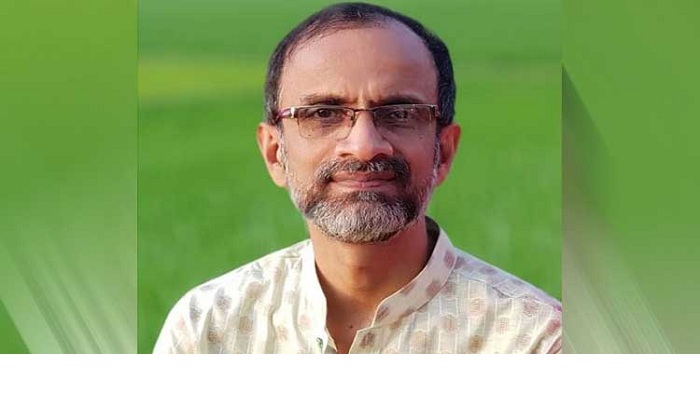Fuel price hike: Burden just passed on to consumers
Published:
2021-11-05 09:47:39 BdST
Update:
2026-02-22 00:03:48 BdST

The fuel price hike is going to be an unbearable burden with its cascading effects – from irrigation cost to transportation of commodities, all will shoot up and eventually be passed on to consumers.
The dent in the consumer's wallets caused by the hike in kerosene and diesel prices comes at a time when most people are already struggling with rising commodity prices.
Public bus and goods transport owners, who have suffered heavy losses because of lockdowns, called for an indefinite strike across the country, demanding that fares be readjusted.Launch owners will announce their decision on fare hike on Friday.
As soaring fuel prices are a global concern now, countries – from India to Italy – are taking measures to lessen the burden on people when the economy has just started recovering from repeated shocks of the pandemic.
India has cut taxes on petrol and diesel, which will result in reduction in prices up to Tk20 per litre at consumer levels on Wednesday – the same day Bangladesh's state-run fuel monopoly increased the prices of diesel and kerosene by Tk15 to Tk80, citing a rise in global prices of crude oil.
Experts say the government of Bangladesh could have taken similar measures – cutting taxes on fuel sales to lessen the impact on people's life and the economy that is now on a recovery track.
The recovery of businesses from pandemic-led losses will hit a bump with the sudden hike in fuel prices, they add.
At present, the government collects revenue from fuel sales in the four forms of taxes, including VAT, duty, and trade tax – which collectively stands at around 30%.
Sources at the BPC said the government's annual revenue earnings from fuel sales amount to around Tk9,000 crore.
Diesel alone accounts for around 78% of the country's fuel consumption. In FY21, the diesel consumption was 45.97 lakh tonnes, while the country's total fuel consumption stood at 63 lakh tonnes.
Transport and agriculture sectors are going to suffer a hard knock owing to the fuel price hike because 75% of buses, trucks, launches and trains run on diesel, while 99% of irrigation pumps are dependent on this type of fuel, according to the BPC.
Prof Dr M Tamim, eminent energy expert and special assistant to the former chief adviser of the caretaker government, said, "The government could have minimised BPC's losses by slashing some existing taxes on fuel sales instead of the price hike."
Bus fares and price of essential commodities will go up with the fuel price hike, which will ultimately affect the people, he added.
Dr Zahid Hussain, former lead economist at the World Bank Dhaka office, told The Business Standard that the country's policy regarding fuel prices is not right. Global fuel prices witnessed a repeated fall over the last seven-eight years, but local prices did not drop. So, now, adjusting fuel prices in line with global hikes is not logical, he noted.
"The fuel price hike in keeping with the global market would have been acceptable if we had reduced it when global prices were low," Dr Zahid said.
Talking about its ultimate effect on limited-income people, the economist said increasing fuel prices was not a wise decision as such a hike in the international market might not continue for a long time.
Giving a subsidy for the time being, the government could have consulted all stakeholders, including transport owners, before going for the move, he said, adding that all would accept a logical price increase.
Rizwan Rahman, president at Dhaka Chamber of Commerce and Industry said, "The sudden hike in fuel prices will throw a spanner in the efforts to make a turnaround from pandemic-induced losses."
The government could have kept fuel prices under control if it wanted to by subsidising. The economy could have overcome pandemic shocks if fuel prices had remained stable for at least six months, Rizwan added.
This hike without discussion with businesses brings in a bad time for both manufacturers and consumers.
Transport strike demanding fare readjustment
The country's public bus and goods transport owners have called for a nationwide strike from Friday morning, protesting the government's decision to raise diesel and kerosene prices.
Bangladesh Truck-Covered Van Owners' Association President Md Tofazzal Hossain Majumder confirmed it to The Business Standard on Thursday.
"Transport owners are already under a lot of pressure. It will be impossible for us to run our vehicles with the increased cost of fuel. This move [fuel price hike] is illogical," he said.
Moreover, the government did not discuss the issue of price hike with transport leaders, Tofazzal claimed.
He added that the strike will continue until further notice.
Besides, Bangladesh Truck-Covered Van, Tank Lorry, Prime Mover Owners and Workers' Coordination Council, in a written statement yesterday said the government has now increased fuel prices after raising the toll for Bangabandhu and Muktarpur bridges, which will add to the misery of the already Covid-19 ravaged transport sector.
Secretary General of Bangladesh Road Transport Owners' Association Khandaker Enayet Ullah said, "We shall not operate buses at loss."
Earlier in the day, the Bangladesh Road Transport Owners Association sent a letter addressing the secretary of the Ministry of Road Transport and Bridges and the private secretary to the Road Transport and Bridges Minister to increase fares for long haul buses.
The letter read that the bus fare on the long routes including Dhaka and Chattogram has remained unchanged in the last eight years. However, the prices of all kinds of spare parts and fuel had increased during this period.
Also, the transport owners incurred huge losses due to the Covid-19 pandemic. With the government increasing the fuel prices, it would be very difficult to survive in the sector, read the statement.
The association also claimed they had asked the ministry to increase the fare several times, but no such steps were taken.
Md Mahbub-E-Rabbani, director and spokesperson at Bangladesh Road Transport Authority, said the committee, formed with representatives from different transport owners' associations and government authorities, might decide on the readjustment of fares in a meeting on Sunday.
In the meantime, launch owners will come up with their position on the fuel price hike after holding a meeting Friday.
Siddiqur Rahman Patwary, office secretary at Bangladesh Inland Waterways (passenger carriers) Association, said, "We are yet to make a decision about going for a tougher movement. Our leaders will sit again tomorrow and will make the final decision."
The decision over increasing train fares will come after the prime minister returns home, a senior information officer said.
Impacts already on commodity prices, bus fares
Prices of different vegetables in the capital's kitchen markets went up by 15%-55% on Thursday.
Sharif Ahmed, a retail seller at Segunbagicha kitchen market, told TBS that prices of vegetables, such as bitter gourd, potatoes, and cauliflowers, shot up by Tk20-Tk25 in a day.
Ibrahim Hossain, a rice wholesaler in a Dhaka market, said they have to increase rice prices by Tk1-Tk2 because of the fuel price hike as they have to pay extra for transportation.
Passengers complained that many public buses charged extra fares on Dhaka-Narayanganj route following the fuel price hike.
Prices of chicken, beef, mutton and fish have so far remained unchanged, which might go up in the next few days, say businesses.
How other countries offset impacts on people
Fuel price hike is a global concern, prompting governments to devise measures like duty cuts to offset impacts on low-income households.
In neighbouring India, the central government reduced taxes on petrol and diesel in a bid to lessen adverse impacts on the life of people and the economy struggling to recover from the shocks of lockdowns induced by repeated waves of coronavirus.
Just a day before Bangladesh revised diesel and kerosene price by Tk15 per litre, India had reduced excise duty and value added tax (VAT) which resulted in Tk14-Tk20 (12rupees to 17 rupees) drop in fuel prices at consumer levels.
India's central government on Wednesday cut excise duty by 10 rupees per litre on diesel and 5 rupees per litre on petrol - a step termed as a "Diwali gift" and followed by state governments reducing VAT.
The move would cost the Indian government a revenue loss of 550 billion rupees, a government source tells Reuters.
Sri Lanka, hit hard by inflated oil import bill and steep fall in local currency value, rejected a call from state-owned oil corporation to raise fuel prices although a private oil company hiked prices last month.
As the soaring energy price is affecting life in Europe as well, the European Commission last month unveiled measures like energy tax cuts and state aid designed to offset impacts on low-income people.
Spain, Italy and Portugal scrapped power generation tax, lowered energy tariff and sales tax to help households and businesses weather the impacts of soaring price of oil and gas.
As sharp rise in fuel prices pushed annual inflation to decade-high in some countries in Europe, the EC asked member-countries to offer income support through vouchers, bill payment deferrals or partial bill payments to help people living in poverty or on low incomes.
Inflation posted an upward trend in Bangladesh in previous months owing to rising prices of food and non-food items fuelled mainly by global price hikes.
Fuel price hike might cause further rise in inflationary pressure as it would add to travel cost of commuters and transportation costs of goods. Transport operators on both roads and waterways – have already started to put pressure on the government to hike fares – which will ultimately be passed on to passengers and customers of everything in the kitchen market.
Topic: fuel price transportation

Deputy Commissioner of Dhaka won Digital Bangladesh Award 2020

Government has punished Mahbub Kabir Milon

COVID-19 infections cross 2.50 lakh mark in Bangladesh

'OSD' Additional Secretary of Railways Mahbub Kabir Milon

Dhamaka sent customer's advance money to US!


Leave your comment here: